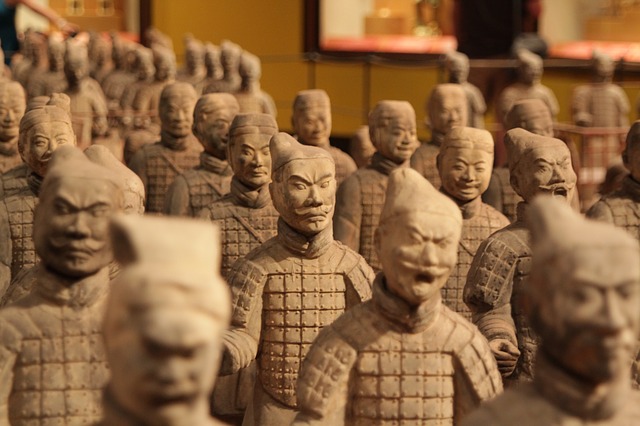Developing a China strategy inspired by Sun Tzu

Developing a China strategy inspired by Sun Tzu
We would advise every company, Small Medium Enterprise (SME) and corporate alike, to develop strategies for expansions into new markets. However, for China, strategy seems to be even more important. This importance is fueled by several different reasons. Firstly because of the sheer size of China. Finding your market is crucial. Secondly due to the generally volatile business environment and thirdly because of Chinese business culture.
The Chinese business culture is a reason we, at 1421, believe is important to elaborate upon. China is the country where business strategy is infused with warfare strategy. The book of writer Sun Tzu, who lived roughly during 5th century BC, is a handbook for many Chinese business owners. Besides writer, Sun Tzu (孫子) was a Chinese General, a military strategist and a philosopher. His strategies, written in “The art of war”, are still relevant in the modern day, in warfare and business. When western businesses go “up” against Chinese counterparts, clients or business partners, they have to be extra strategic too. What can we Westerners learn from Sun Tzu, when developing their China strategy?
China strategy: Feasibility
“One mark of a great soldier is that he fights on his own terms or fights not at all.” – Sun Tzu
This quote by Sun Tzu highlights the importance of assessing the terms of the battle before entering. When looking to do business in China, such an assessment will define the difference between failure and success. The assessment should contain a deep dive in the feasibility of the market. Is the product allowed in China? What taxes are required to be paid? What route to market options are available?
If there obstacles are that one is not able to overcome, perhaps one should consider alternative international expansion opportunities.
China strategy: Market intelligence
“Conformation of the ground is of the greatest assistance in battle.” – Sun Tzu
In order to develop an overall China strategy, you need to be aware of the terrain. Many people think of China as a market with 1.42 billion consumers. However, there are large differences per province, city and even per district. From regulations to culture and language, these differences are vast. Given the size of the country it is no surprise that some provinces differ as much as European countries do.
Therefore, a targeted research should define the true threats and opportunities of your Chinese market. Where in China are my potential clients? How can I reach them? What platforms are available? How do I arrange possible logistics? All these questions need answering.
China strategy: Route to market
“The general who wins the battle makes many calculations in his temple before the battle is fought. The general who loses makes but few calculations beforehand.” – Sun Tzu
Calculating what route to market fits your organization is a very important to your China strategy. Every different route to market has different strengths and weaknesses. By fully understanding those, you can make a solid decision on your future.
For example, you desire to register your own entity in China. Your funds available for the expansion into China are limited, thus bearing the costs of running your business the first three years is not an option. In that case, perhaps you should consider an alternative route. One could consider opportunities which require a lower investment, such as finding a local business partner willing to work as a local distributor.
China strategy: Tactics
“Strategy without tactics is the slowest route to victory. Tactics without strategy is the noise before defeat.” – Sun Tzu
After developing your overall strategy to China, it is important to determine the tactics. Tactics are actions you take towards your goal. Based on your strategy, you should create an action plan in order to realize your strategy.
For instance, you want to become successful in China trough your own entity. This beautiful goal is empty without a plan of approach considering all necessary implementations. Such a list contains steps like registering the entity, filing your intellectual property rights, finding and hiring the right people, managing the company, etc. Therefore, a plan of approach creates an overview, which is crucial to reaching solid results as a company.
China Strategy: Flexibility
“Opportunities multiply as they are seized.” – Sun Tzu
Although you have made a plan, China is a country of surprising and unexpected opportunities. It is important to seize these opportunities as they present themselves. For example, when you focus on local entrepreneurs as clients, but a large state-owned company expresses interest in your product, you might want to consider the opportunity. Without such flexibility, China can be a cruel mistress. Doors shut as quickly as they open.
Furthermore, flexibility in China is not just required when considering big opportunities. The Chinese business environment requires flexibility towards simple aspects such as planning your agenda. Last minute agenda changes are very common in China. Also China’s legal environment is a reason to be flexible. Regulation changes can, and will, be implemented overnight, forcing you to adapt your strategy regarding possible legal challenges or opportunities.
China Strategy: Stick to your plans
“You have to believe in yourself.” – Sun Tzu
Although seemingly conflicting with the previous advice, it is important to stick to your China strategy. Even when you act upon certain opportunities, it is still important to make sure you adhere to the overall goals of your strategy. This will prevent you from venturing into adventures in China which do not align with your own desires or requirements.
Such situations arise when dealing with Chinese counterparts. Often seemingly out of thin air they tend to adapt their strategy towards you. They might suggest changes which are not in line with your original intended China strategy. However, you have to dare sticking to your strategy, convincing your Chinese counterpart of your preferred approach.
A much seen example originates from exclusivity. Almost all Chinese distributors will push for exclusive distribution contracts. Even though they only focus on a specific area in China. Many Western organizations give in, in the hope this exclusivity will make the Chinese distributor work harder. Even if the Western organizations originally considered, rightfully so, that China is too large for exclusivity to any company. By giving exclusive rights to one distributor, they had to give up the part of their strategy to reach more area’s in China.
China Strategy: Know Yourself
“If you know the enemy and know yourself, you need not fear the result of a hundred battles.” – Sun Tzu
Finally, it is important to know yourself. Understand your own weaknesses and threats. Not just as a company, but also as an individual. To understand culture differences, is to understand your own culture. A very direct Dutch person should learn to be less direct. A very timely German should learn to be flexible regarding appointments. Understanding yourself is equally important as all components mentioned in this article about developing a China strategy.
Related posts





